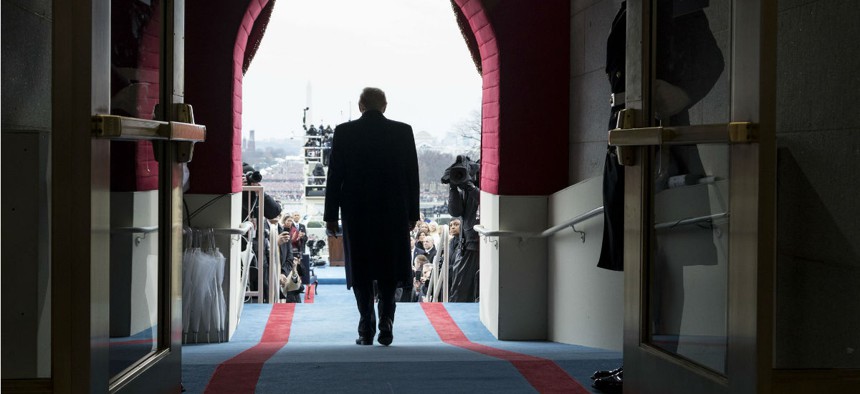
President-elect Donald Trump walks to take his seat for the inaugural swearing-in ceremony at the U.S. Capitol in Washington on Jan. 20. Official White House Photo by Shealah Craighead
The federal whistleblower community in recent years has seen an array of new laws, headline cases and bipartisan calls from lawmakers for new protections.
Whether its members turn out to be misguided attention-seekers or brave souls risking their jobs (and peace of mind) to call out waste, fraud or abuse, they all need legal tools.
Which is why Stephen Kohn, a longtime attorney specializing in whistleblowers at the nonprofit National Whistleblower Center, just released an expanded edition of “The New Whistleblower’s Handbook: A Step-by-Step Guide to Doing What's Right and Protecting Yourself” in time for the Trump era.
The updated, 550-page paperback comes at a time when the Trump administration has demonstrated some sympathy for whistleblowers, but has also been attacked for allegedly stifling the communications of agency employees who might be exercising their whistleblower rights.
“Good whistleblowing is apolitical, and falls where it falls,” Kohn said in an interview with Government Executive. A disclosure “should be a neutral expose of waste, fraud and abuse and violations of law” regardless of who is president.
So Kohn, in adding 200 pages, wrote a chapter titled “Politics is Poisonous,” which states that “Allegations raised by employees often embarrass elected officials, political appointees, or well-connected special interests.” Given this threat, “it is important for whistleblowers to determine which laws are best shielded from political pressure,” Kohn writes.
His enhanced sections on federal employees describe past instances in which whistleblower laws have become politicized.
He explores the case of now-exiled fugitive former National Security Agency contractor Edward Snowden, who exposed the extent of U.S. domestic surveillance of telephone communications. “Some argued he was a whistleblower, others labeled him a 'leaker,' while yet others considered him a traitor.” Eventually, someone was going to disclose the post- 9/11 anti-terrorism program as intrusive, Kohn argues. “The legal protections afforded employees like Snowden, who wanted to expose illegal government actions, were grossly deficient.”
Also examined is the Supreme Court-level case of former Transportation Security Administration Air Marshal Robert MacLean, who lost his job after going to a TV station (after trying to go through his bosses) with a warning that TSA had ceased assigning air marshals to all flights. “Significantly, there was no law that prohibited his communications with the press,” Kohn notes. “Instead he violated regulations issued by his employer.”
To minimize politicization of the law, Kohn said, whistleblowers and their legal advisers need to understand the political appointees handling their cases—be they at the Office of Special Counsel, the Merit Systems Protection Board, or a Labor Department board. “It’s a heads-up to employees that they need to know who’s on the boards,” he said in the interview. “Under most of laws, they can go to federal court and get a jury trial, but if they decide or go to an administrative agency, it’s important to know who the judges are.
New laws, such as the 2012 Whistleblower Protection Enhancement Act, have improved the law, Kohn said. He also expanded his discussion of the First Amendment rights of federal employees. “Blowing the whistle through the press, blogs, teaching, writing and speaking are important precedents that give constitutional protections,” he said.
The book includes a wealth of material on whistleblowing in the corporate sector.
Kohn’s fellow whistleblower attorney Tom Devine, legal director of the Government Accountability Project, told Government Executive he has not seen a surge in whistleblower complaints during the first six months of the Trump administration—but he anticipates one.
Kohn says the number of complaints remains high. “That’s because, I believe, under Obama people felt more comfortable raising a concern. In the new era, people maybe have more concerns but feel less comfortable,” Kohn added. He sees a “heightened concern over retaliation, which can have a chilling effect.”
“For every one person jumping in, one person is getting afraid” to come forward, he said.







